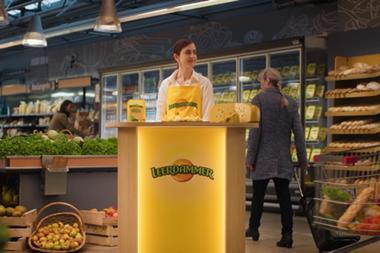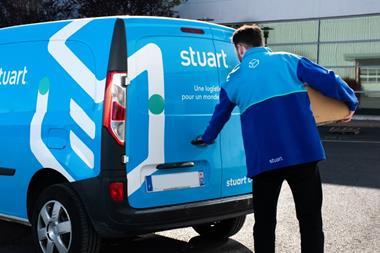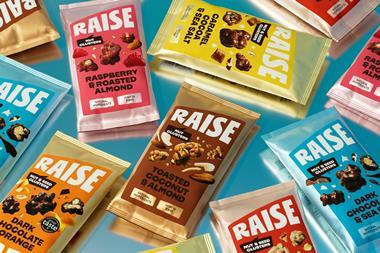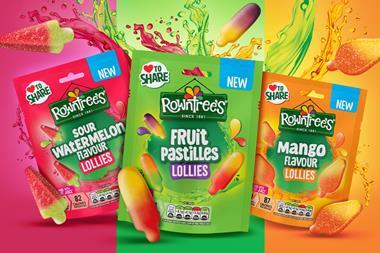Four retailers tell us how installing a food- and drinks-to-go offer has transformed their businesses and improved their profits
"Food to go," says Spar retailer Peter Sichel, "is no longer an option for today's convenience store operator. It is a necessity."
Peter took a mighty leap of faith when he introduced a small food-to-go offer to his 600sq ft store in the sleepy Buckinghamshire village of Holmer Green in 2005 but, he says, he has never looked back.
"I was quite apprehensive at first as the village has a small population and it doesn't attract a great deal of passing trade, but I decided to take the plunge anyway as I truly believed that it would work." And what a plunge it was. Even in Peter's small store, the cost of implementing the offer, which includes a freshly ground coffee machine, hot food tower, oven, display racks and extra freezers, rang in at a pocket-lurching £10,000. But two years on, and a few hair-raising moments later, Peter is adamant that it was money very well spent.
"It wasn't easy at first as it takes a while for people to get used to the idea. There were days at the beginning when I can remember throwing away more than we made, which was heartbreaking," he says. "However, we stuck with it and two years on we are now reaping the rewards."
Sales of food-to-go products are now growing by 25% a year at Peter's store, and were worth a staggering £58,000 in 2006, with the figure for 2007 expected to be even higher.
"Food to go sales now make up just over 10% of my weekly business," Peter says. "That figure is simply too big to be ignored. Convenience store retailers can no longer survive on grocery sales alone. The margins are simply not big enough anymore."
And Peter wholeheartedly believes that a well run food-to-go offer is key to fighting back against grocery's big boys.
"Convenience stores can't compete against the likes of Tesco and Asda in terms of range, but where they really do have the edge is customer service. The supermarkets are simply too big to offer the same personal service that we can, and convenience store retailers should aim to make their food-to-go offers a real point of difference."
As well as tea and coffee, Peter now sells a comprehensive range of easily prepared hot and cold snacking products including freshly baked baguettes, sandwiches, breakfast baps, pies and cakes as well as old favourites such as sausage rolls, a real hit with the area's older generation.
"I believed in the idea of food to go from day one and I was right, too. The success that I have had in my small store proves that you don't need to be a big outfit to make a real go of it. All you need is commitment, organisation and belief in the concept," he says.
"Food to go is the cornerstone of modern convenience retailing, and if you want to survive in today's ultra-competitive retail playing field you need to get in on the game, and fast."
It is now a little over a year since M to Go, the novel convenience retailing concept born out of a special partnership between Merseyrail (Merseyside's urban rail network) and Nisa-Today's, was first launched in Moorfields station.
The concept is unique. Gone are the grimy ticket offices of old with their bullet-proof glass-fronted counters and steel delivery boxes. In their place sits a large airy store with an integrated ticket and food-to-go offer, including freshly baked bread, sandwiches and pastries, as well as hot and cold drinks.
Merseyrail says that the M to Go concept stems from a desire to add value to the customer experience, but as Ingrid van Poelgeest, Merseyrail's customer services director, explains, it's doing so much more than that.
"Introducing food to go has also had a wonderful impact on staff happiness," she says. "The constant need to refresh displays, prepare food and clean equipment has made their working days a lot more varied, and it's also given them a vast array of new skills," she says. "They are also able to interact properly with customers now that they are out from behind the ticket counters. It has made for a much more lively atmosphere and pro-active workforce."
Sales are looking equally healthy, she adds. "Having an integrated store and ticket office has done wonders for sales. Many people who come in just to buy a ticket end up buying a freshly ground coffee or sandwich. It's so convenient, and most importantly it looks fantastic. It's all about offering our customers a service and turning the most mundane of things, such as buying a rail ticket, into an experience."
The next job on the agenda, says van Poelgeest, is to start growing sales. And she has a number of tricks up her sleeves to achieve this.
"One of the first steps will be to promote the concept a little better," she says. "We will also be introducing healthier foods such as ready-made salads, as well as extending the low-fat Weight Watchers sandwich range - an increasingly popular choice as the trend towards healthier and more natural foods gains momentum."
The M to Go format is set to be rolled out to some 30 stations from Merseyrail's 66-strong portfolio. Once this has been completed, Serco also plans to use the concept in its other rail franchises in the UK.
With its ultra high-spec chrome and glass counters, mouthwatering salt beef carvery and cooked meats counter, Budgens' newest London store on the city's bustling Holloway Road is nothing like a Budgens as you know it.
"I wanted food to go to be at the very heart of our offer," explains independent owner Shalil Bhatessa. And it's safe to say he got what he wanted. The store has now been trading for just over two months and Shalil is thrilled with the results.
The store's pièce de résistance, a fresh smoothie bar, is positioned right at the entrance where customers can't fail to notice the eye-catching menu of blends, or smell the refreshing tang of freshly squeezed fruit juices.
"The smoothie bar was a must-have for the store - not only does it look fantastic, which helps to pull customers in from outside, but it also capitalises on the trend towards healthy fresh foods, which is what Budgens is all about," he says.
He has also introduced a range of 'functional' smoothies for customers eager to kickstart their mornings.
"Fat Fighter and Hangover Help are particularly popular choices around here," he says.
Next to the smoothie bar sits a wide range of freshly made paninis, pies and pasties for people looking to grab a snack on the go - while a little further down the counter lies an impressive hot salt beef carvery, rôtisserie and fresh Noon curry range. Customers can also choose from a wide range of speciality breads and fillings to make a customised sarnie.
"Food to go is the future," says Shalil. "Lifestyles have got busier and convenience is now of the utmost importance to shoppers."
He has even introduced a special serving hatch between the store and the pavement so that customers in a rush can grab a coffee or snack without even having to step inside.
Shalil wholeheartedly believes that food to go represents a huge opportunity for convenience store retailers, particularly when it comes to differentiating themselves from the supermarkets.
"A decent food-to-go offer, even if it's just a good cup of coffee, can create a real point of difference between us and them," he says. "The supermarkets simply cannot replicate the same high levels of service that we can."
Shalil employs two full-time members of staff to man his food-to-go counter. They wear different uniforms from the rest of the Budgens team, which he says looks more professional and creates the look of a shop-within-a-shop.
He has also installed an easy-to- use hot drinks machine for customers who prefer a self-serve option. "By having both options we have ensured all our bases are covered. Our offer can meet the needs of every shopper, no matter how busy they are."
Spar's flagship store at Battlefield near Shrewsbury sets a new standard in food to go - in fact, it's one of the first of a new generation of stores to be designed around the eat-in food outlet.
The 3,000sq ft Spar is located on the junction of two major roads, at the gateway to the tourist destinations of North Wales. With 48,000 cars passing every day, it was seen as a prime transit site, but soon after opening in January it became clear that it wasn't just passing trade that was pouring in through the doors. Local residents were seeing the store and its excellent hot food offering as a destination in itself.
It's easy to see why they are so impressed when you enter the store. The food and drink area, situated in the rear left-hand corner, takes up about a fifth of the floor space. Clever lighting, bright signage and a distinctive wooden floor make the area the focus of the store, and the aisles all radiate out from it like the rays of the sun, so there's hardly a point in the building where you aren't in full view of its continental café-style seats and tables.
As well as a hot food counter, self-vend fresh coffee, doughnuts and Danish pastries and a Treehouse smoothie bar, there are customer toilets and TV screens showing news, cartoons and sports. The overall impression is of somewhere you could spend a while relaxing while picking up your shopping, and that may be what's making local residents bypass the Tesco Extra half-a-mile away to visit Battlefield instead.
Tates managing director Geoff Hallam says that the café area was first on the floor plan when the store layout was designed. "We built the rest of the store around it," he tells Convenience Store. "Although it's on an excellent transit site, our customer research shows that local people are also making short trips to come here. The store has become a destination in itself - we've even been asked if we can put up a community noticeboard, which suggests it's being seen as a hub of the area."
Store manager Dave Hammond confirms that the store has become a local point of interest - he's heard the local radio referring to the junction as 'the Spar roundabout'. "We get families coming in on their way home from a day out," he says. "They are choosing us as a healthier alternative to McDonald's."
During the week, trade is 70% from transient customers, although locals drop in from nearby offices. They are particularly keen on the paninis, ciabattas and wraps which are baked to order in three minutes.
At weekends it's more like 70% local customers, and it's clear people are comfortable combining shopping and snacking. "We often find empty coffee cups in the aisles," says Dave, "so it's clear they do walk the floor while they're here. Most will do a shop, then sit down for a snack with their basket under the table."
The section has its own manager and will have three supervisors. There are six dedicated staff, but as it is turning over almost £6,000 a week - second only to cigarettes and tobacco in its contribution to the store's revenue - Dave has made sure every member of staff can work on the counter if needed.
If there's a drawback to the beautifully designed store, it's that customers walk in expecting to pay premium prices, when in fact it's pitched at local rates. The smoothie bar, for example, is trialling a 99p fixed price, against as much as £2.50 in the town centre.
Spar Holmer Green
"Food to go," says Spar retailer Peter Sichel, "is no longer an option for today's convenience store operator. It is a necessity."
Peter took a mighty leap of faith when he introduced a small food-to-go offer to his 600sq ft store in the sleepy Buckinghamshire village of Holmer Green in 2005 but, he says, he has never looked back.
"I was quite apprehensive at first as the village has a small population and it doesn't attract a great deal of passing trade, but I decided to take the plunge anyway as I truly believed that it would work." And what a plunge it was. Even in Peter's small store, the cost of implementing the offer, which includes a freshly ground coffee machine, hot food tower, oven, display racks and extra freezers, rang in at a pocket-lurching £10,000. But two years on, and a few hair-raising moments later, Peter is adamant that it was money very well spent.
"It wasn't easy at first as it takes a while for people to get used to the idea. There were days at the beginning when I can remember throwing away more than we made, which was heartbreaking," he says. "However, we stuck with it and two years on we are now reaping the rewards."
Sales of food-to-go products are now growing by 25% a year at Peter's store, and were worth a staggering £58,000 in 2006, with the figure for 2007 expected to be even higher.
"Food to go sales now make up just over 10% of my weekly business," Peter says. "That figure is simply too big to be ignored. Convenience store retailers can no longer survive on grocery sales alone. The margins are simply not big enough anymore."
And Peter wholeheartedly believes that a well run food-to-go offer is key to fighting back against grocery's big boys.
"Convenience stores can't compete against the likes of Tesco and Asda in terms of range, but where they really do have the edge is customer service. The supermarkets are simply too big to offer the same personal service that we can, and convenience store retailers should aim to make their food-to-go offers a real point of difference."
As well as tea and coffee, Peter now sells a comprehensive range of easily prepared hot and cold snacking products including freshly baked baguettes, sandwiches, breakfast baps, pies and cakes as well as old favourites such as sausage rolls, a real hit with the area's older generation.
"I believed in the idea of food to go from day one and I was right, too. The success that I have had in my small store proves that you don't need to be a big outfit to make a real go of it. All you need is commitment, organisation and belief in the concept," he says.
"Food to go is the cornerstone of modern convenience retailing, and if you want to survive in today's ultra-competitive retail playing field you need to get in on the game, and fast."
M to Go
It is now a little over a year since M to Go, the novel convenience retailing concept born out of a special partnership between Merseyrail (Merseyside's urban rail network) and Nisa-Today's, was first launched in Moorfields station.
The concept is unique. Gone are the grimy ticket offices of old with their bullet-proof glass-fronted counters and steel delivery boxes. In their place sits a large airy store with an integrated ticket and food-to-go offer, including freshly baked bread, sandwiches and pastries, as well as hot and cold drinks.
Merseyrail says that the M to Go concept stems from a desire to add value to the customer experience, but as Ingrid van Poelgeest, Merseyrail's customer services director, explains, it's doing so much more than that.
"Introducing food to go has also had a wonderful impact on staff happiness," she says. "The constant need to refresh displays, prepare food and clean equipment has made their working days a lot more varied, and it's also given them a vast array of new skills," she says. "They are also able to interact properly with customers now that they are out from behind the ticket counters. It has made for a much more lively atmosphere and pro-active workforce."
Sales are looking equally healthy, she adds. "Having an integrated store and ticket office has done wonders for sales. Many people who come in just to buy a ticket end up buying a freshly ground coffee or sandwich. It's so convenient, and most importantly it looks fantastic. It's all about offering our customers a service and turning the most mundane of things, such as buying a rail ticket, into an experience."
The next job on the agenda, says van Poelgeest, is to start growing sales. And she has a number of tricks up her sleeves to achieve this.
"One of the first steps will be to promote the concept a little better," she says. "We will also be introducing healthier foods such as ready-made salads, as well as extending the low-fat Weight Watchers sandwich range - an increasingly popular choice as the trend towards healthier and more natural foods gains momentum."
The M to Go format is set to be rolled out to some 30 stations from Merseyrail's 66-strong portfolio. Once this has been completed, Serco also plans to use the concept in its other rail franchises in the UK.
Budgens Holloway Road
With its ultra high-spec chrome and glass counters, mouthwatering salt beef carvery and cooked meats counter, Budgens' newest London store on the city's bustling Holloway Road is nothing like a Budgens as you know it.
"I wanted food to go to be at the very heart of our offer," explains independent owner Shalil Bhatessa. And it's safe to say he got what he wanted. The store has now been trading for just over two months and Shalil is thrilled with the results.
The store's pièce de résistance, a fresh smoothie bar, is positioned right at the entrance where customers can't fail to notice the eye-catching menu of blends, or smell the refreshing tang of freshly squeezed fruit juices.
"The smoothie bar was a must-have for the store - not only does it look fantastic, which helps to pull customers in from outside, but it also capitalises on the trend towards healthy fresh foods, which is what Budgens is all about," he says.
He has also introduced a range of 'functional' smoothies for customers eager to kickstart their mornings.
"Fat Fighter and Hangover Help are particularly popular choices around here," he says.
Next to the smoothie bar sits a wide range of freshly made paninis, pies and pasties for people looking to grab a snack on the go - while a little further down the counter lies an impressive hot salt beef carvery, rôtisserie and fresh Noon curry range. Customers can also choose from a wide range of speciality breads and fillings to make a customised sarnie.
"Food to go is the future," says Shalil. "Lifestyles have got busier and convenience is now of the utmost importance to shoppers."
He has even introduced a special serving hatch between the store and the pavement so that customers in a rush can grab a coffee or snack without even having to step inside.
Shalil wholeheartedly believes that food to go represents a huge opportunity for convenience store retailers, particularly when it comes to differentiating themselves from the supermarkets.
"A decent food-to-go offer, even if it's just a good cup of coffee, can create a real point of difference between us and them," he says. "The supermarkets simply cannot replicate the same high levels of service that we can."
Shalil employs two full-time members of staff to man his food-to-go counter. They wear different uniforms from the rest of the Budgens team, which he says looks more professional and creates the look of a shop-within-a-shop.
He has also installed an easy-to- use hot drinks machine for customers who prefer a self-serve option. "By having both options we have ensured all our bases are covered. Our offer can meet the needs of every shopper, no matter how busy they are."
Spar Battlefield
Spar's flagship store at Battlefield near Shrewsbury sets a new standard in food to go - in fact, it's one of the first of a new generation of stores to be designed around the eat-in food outlet.
The 3,000sq ft Spar is located on the junction of two major roads, at the gateway to the tourist destinations of North Wales. With 48,000 cars passing every day, it was seen as a prime transit site, but soon after opening in January it became clear that it wasn't just passing trade that was pouring in through the doors. Local residents were seeing the store and its excellent hot food offering as a destination in itself.
It's easy to see why they are so impressed when you enter the store. The food and drink area, situated in the rear left-hand corner, takes up about a fifth of the floor space. Clever lighting, bright signage and a distinctive wooden floor make the area the focus of the store, and the aisles all radiate out from it like the rays of the sun, so there's hardly a point in the building where you aren't in full view of its continental café-style seats and tables.
As well as a hot food counter, self-vend fresh coffee, doughnuts and Danish pastries and a Treehouse smoothie bar, there are customer toilets and TV screens showing news, cartoons and sports. The overall impression is of somewhere you could spend a while relaxing while picking up your shopping, and that may be what's making local residents bypass the Tesco Extra half-a-mile away to visit Battlefield instead.
Tates managing director Geoff Hallam says that the café area was first on the floor plan when the store layout was designed. "We built the rest of the store around it," he tells Convenience Store. "Although it's on an excellent transit site, our customer research shows that local people are also making short trips to come here. The store has become a destination in itself - we've even been asked if we can put up a community noticeboard, which suggests it's being seen as a hub of the area."
Store manager Dave Hammond confirms that the store has become a local point of interest - he's heard the local radio referring to the junction as 'the Spar roundabout'. "We get families coming in on their way home from a day out," he says. "They are choosing us as a healthier alternative to McDonald's."
During the week, trade is 70% from transient customers, although locals drop in from nearby offices. They are particularly keen on the paninis, ciabattas and wraps which are baked to order in three minutes.
At weekends it's more like 70% local customers, and it's clear people are comfortable combining shopping and snacking. "We often find empty coffee cups in the aisles," says Dave, "so it's clear they do walk the floor while they're here. Most will do a shop, then sit down for a snack with their basket under the table."
The section has its own manager and will have three supervisors. There are six dedicated staff, but as it is turning over almost £6,000 a week - second only to cigarettes and tobacco in its contribution to the store's revenue - Dave has made sure every member of staff can work on the counter if needed.
If there's a drawback to the beautifully designed store, it's that customers walk in expecting to pay premium prices, when in fact it's pitched at local rates. The smoothie bar, for example, is trialling a 99p fixed price, against as much as £2.50 in the town centre.




























No comments yet